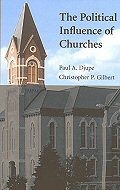|
The Political Influence of Churches
|
|
Paul A. Djupe, Christopher P. Gilbert
|

|

Djupe and Gilbert investigate the political influence of churches: how membership in organized religious bodies shapes the political life of members. Djupe and Gilbert’s goal in this inquiry is to recenter scholarly attention on the voluntary association as an essential element of American civic and political life.
The authors develop a theoretical framework that captures the multifaceted elements of church life that affect individual political attitudes and actions. Political information from clergy, small groups, and social networks flows plentifully in churches, but individuals process that information differently depending on their motivations, and related to their status in the church. Articulating a more fully specified model of how associations expose individuals to political information and norms will help us to understand the political opinions and behavior of citizens, while also providing a clearer understanding of the contribution of churches to sustaining democracy.
Paul A. Djupe is Associate Professor of Political Science at Denison University in Granville, Ohio. He is the coauthor Religious Interests in Community Conflict: Beyond the Culture Wars; The Prophetic Pulpit; Clergy. Churches, and Communities in American Politics; and Religious institutions and Minor Parties in the United States as well as articles on religion and politics appearing in such journals as American Journal of Political Science, Journal of Politics, Political Research Quarterly, Politics and religion, and Journal for the Scientific Study of Religion.
Christopher P. Gilbert is Professor of Political Science at Gustavus Adolphus college in St. Peter, Minnesota. He has written extensively on Minnesota politics, third parties in the United States, and the religious dimensions of American Political Behavior.
|
|
